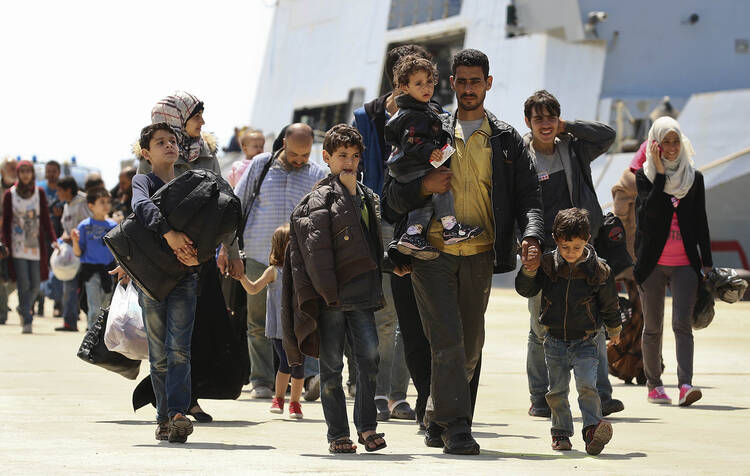The Jesuit Refugee Service expressed disappointment today with the measures announced by the European Union to respond to the accelerating migrant crisis in the Mediterranean, describing the outcome after meetings in Brussels as “a lost opportunity.”
James Stapleton, J.R.S. International Communications Coordinator, told Vatican Radio that J.R.S. was hoping for something “much stronger” to emerge from the E.U. emergency session on the migrant crisis, a plan which contained elements of resettlement and visas for the migrants and a much stronger focus on saving peoples’ lives as well as tackling the migrant crisis at its roots. Instead, he said, E.U. representatives agreed “on a raft of measures” aimed at “hiding the problem.”
In a statement released April 23, J.R.S. charged, "The E.U. has yet again failed to prioritize saving the lives of people fleeing conflict and persecution." While the service "sincerely hopes last night's European Council decision to increase resources to Frontex will lead to improved 'search and rescue' of forced migrants crossing the Mediterranean," J.R.S. "fears the consequences of the raft of measures designed to prevent forced migrants from gaining access to the protection they are so desperately seeking."
"Hundreds of thousands of forced migrants are faced with little option other than taking extremely dangerous journeys such as those across the Mediterranean. The overwhelming focus on combating smuggling ignores the fact that the vast majority of the people coming through this route are seeking protection. Preventing their arrival into North Africa will not protect them. Our focus should be protecting people, not borders", said JRS International Director, Peter Balleis, S.J.
Forced migrants need safe access to protection, Balleis added. He said, "Suggestions of increasing voluntary resettlement quotas among EU states are welcome but it is worrying that no concrete number has been mentioned in the final statement. According to the UN refugee agency, there are currently one million refugees in need of resettlement. Yet the annual quota in industrialised nations is less than 80,000 a year.
Father Balleis worries that E.U. measures designed to keep people in countries of transit outside the continent "will not stop them from moving on in search of meaningful protection."
"We need substantial increases in the use of resettlement, family reunification, humanitarian visas and the temporary lifting of visa requirements," he said, "if we are to stem the illegal smuggling. It is the lack of protection and access to regular migration channels which fuels smuggling."
Stapleton complained Europe is “out-sourcing its problems and its responsibilities.” Noting that the British Prime Minister David Cameron had pledged ships, helicopters and other resources, but at the same time said his government was not prepared to accept any more asylum seekers in Britain, Stapleton said, “What’s happening is a shirking of responsibilities” rather than "a sharing of responsibilities" for dealing with the migrant crisis.








